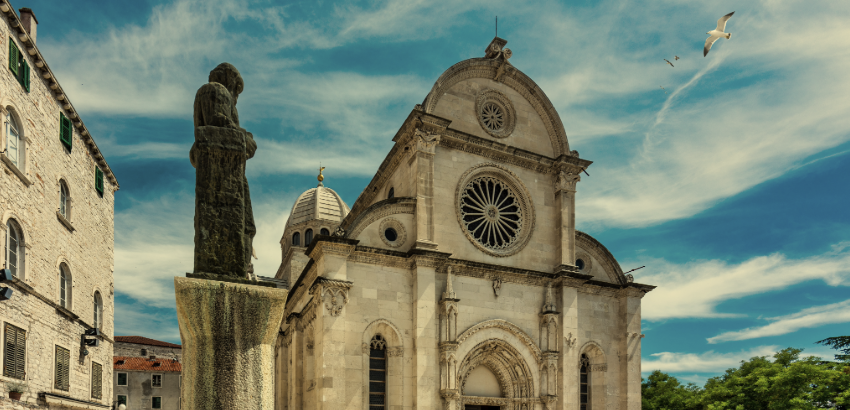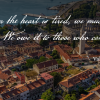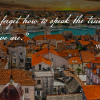
Published: August 14, 1999
View the Original Newsletter: Iskra-40.pdf
About This Issue
Iskra No. 40 captures the spirit of late-summer 1999 — a mix of optimism, frustration, and heartfelt reflection. The issue opens with Valentina Krčmar’s sharp editorial commentary on the failures and potentials of Croatia’s tourism sector, moving through heartfelt tributes, global and national political developments, and the tireless efforts of the Croatian diaspora to support their homeland. It closes with health advice, cultural insights, and a strong call for accountability in leadership.
Motrišta: “Our Adriatic Sea”
In her featured column, Valentina Krčmar writes passionately about Croatia’s tourism challenges, expressing both pride in the country’s natural beauty and deep frustration with bureaucratic incompetence. She recalls a disastrous July incident on the Pag Bridge where thousands of tourists were stranded for hours in the heat without water, shelter, or assistance — an event she calls a “fiasco that could have been a triumph.”
She laments the lack of organization and compassion, noting that simple acts of hospitality — blankets, water, or sandwiches — could have turned the situation into positive international publicity for Croatia.
Krčmar also criticizes political interference in tourism, especially a case in Dubrovnik where Mayor Vido Bogdanović refused to meet a Turkish business delegation for political reasons. “Tourism and politics should never walk hand in hand,” she argues, insisting that professionalism must outweigh ideology when national reputation is at stake.
Her essay concludes with a direct rebuke to Tourism Minister Ivan Herak, questioning how such mismanagement could continue unchecked. “Tourism is not a game,” she writes. “It is our livelihood. Every tourist who leaves unhappy takes with them a story that could cost us thousands more.”
From the Editor’s Desk
Valentina opens her editorial letter with humor and honesty about the unpredictability of life — even joking that she may have “wished too loudly” for cooler weather after weeks of unbearable heat. Yet she quickly turns to more serious matters, addressing misleading Canadian media reports about alleged contamination among peacekeepers stationed in Croatia.
Citing later corrections buried deep within Canadian newspapers, she points out that initial accusations had unfairly damaged Croatia’s reputation. She calls for an apology and greater responsibility from international journalists, defending Croatia’s integrity with firm conviction.
The editorial also includes a note of gratitude to readers and supporters, as Krčmar thanks those who helped her continue publishing despite recent illness. “They say wealth is not in money,” she writes, “but in the people who love and respect you.”
In Memoriam: Dr. Srećko Pšeničnik
A heartfelt tribute honors Dr. Srećko Pšeničnik, who passed away in Croatia after a life devoted to the idea of a free and independent homeland. The article remembers him as a gentleman of intellect and integrity — a man who stood firm in his beliefs during the darkest times of communist rule.
“Beautiful young people are nature’s work,” writes Drago Geoheli in his tribute, “but beautiful old people are works of art.”
Community and Humanitarian Work
-
Canadian Croatians Visit Vukovar — Members of the Croatian Humanitarian Association of Southern Ontario travel to Vukovar to oversee the restoration of the Croatian Veterans’ Home, to which they have donated over $140,000 CAD.
-
“Samaritan” Rehabilitation Center in Split — The Croatian Fraternal Union of America and Canada, led by Bernard Luketich, launches a campaign to raise $75,000 to install heating and cooling systems in the Split rehabilitation center for children and youth with disabilities.
-
Toronto HBZ Federation — Expresses gratitude to all participants of its 26th anniversary celebration, recognizing community volunteers and visiting dignitaries.
News Highlights
-
Prime Minister Zlatko Mateša inspects wildfire damage near Split and Kaštela, confirming no need to declare a state of emergency.
-
SNV Statement on Berak Murder — Serbian National Council condemns a killing in Eastern Slavonia as a threat to legal stability.
-
Jadranka Kosor reports that Croatia is still searching for 1,700 missing persons from the war.
-
New Yugoslav Government Formed — Momir Bulatović reshuffles the federal cabinet, appointing several nationalist hardliners, including Vojislav Šešelj’s allies.
-
Zoran Knežević appointed as the new Yugoslav ambassador to Zagreb.
Cultural and Linguistic Notes
An editorial commentary by Kazimir Orešković argues for the preservation of the Croatian language against the growing use of English words such as “transparent,” “briefing,” and “education.” He praises nations like France and Poland for passing laws to protect their languages, suggesting Croatia should follow suit.
Health and Science
-
Interview with Engineer Vladimir Benković — A Toronto-based Croatian shares how he overcame diabetes through determination, diet, and exercise, encouraging readers to stay disciplined and avoid sugary drinks.
-
Dr. Marko Mihić introduces a groundbreaking insulin spray being tested in Toronto as a pain-free alternative to injections, offering new hope for diabetics.
Sports and Community Life
A report from Kitchener, Ontario, recounts a tense soccer match between N.K. Hrvat and Beograd. Despite a 6–1 victory for the Croatian team, post-game provocations led to scuffles outside the stadium. The piece condemns violence in sports and calls for fair play on and off the field.
Literary and Cultural Highlights
Poet Marija Bašić (Nina Novak) releases her second collection, Sahranjene Iluzije (Buried Illusions), described as tender and reflective, filled with “the warmth of memory and compassion.”
Another report celebrates Fra Andrija Nikić’s discovery of the oldest known Štokavian-Croatian dictionary manuscript — Blago jezika slovinskoga ili Slovnik — written in the 17th century by Fra Ljudevit Lalić.
Closing Thought
Iskra No. 40 reflects a nation in transition — proud yet restless, wounded yet hopeful. It captures Valentina Krčmar’s blend of realism and faith: a belief that Croatia’s progress depends not on politics alone but on integrity, compassion, and the will to do better.




